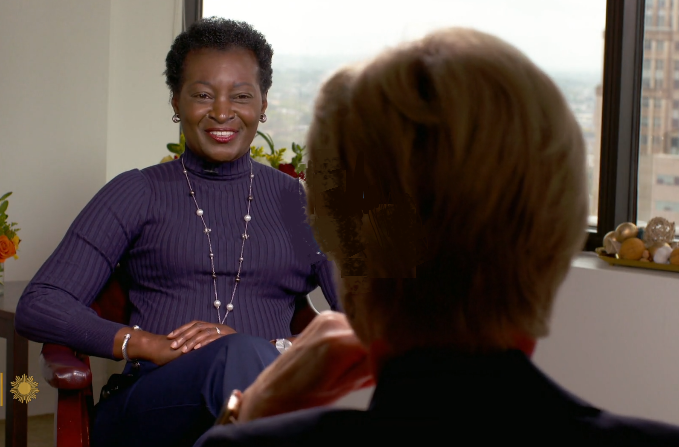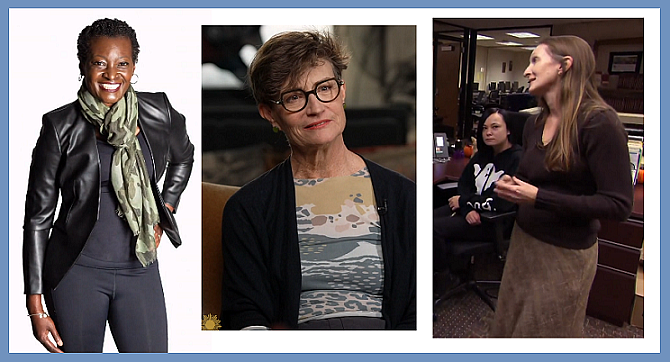Fighting Back Against Ageism
November 19, 2022 at 12:35 p.m.
Sunday Morning host, Jane Pauley, kicks off the discussion by asking, “How old is too old?”
In the story, CBS correspondent Susan Spencer discusses ageism with several people, including 64-year-old entrepreneur Theresa Harrison, University of Oklahoma professor Julie Ober Allen, and author Ashton Applewhite.
Theresa Harrison’s approach to getting old is: “I’ve become more innovative. I’ve become more creative. I’ve become more curious.” The Baltimore-based technology company she founded handles cyber security for the Department of Defense. And when did she start her company? “I was in my fifties when I founded George Street Services,” reveals Harrison.
Susan Spencer points out that the stereotypical view of high-tech entrepreneurs is the hotshot 19-year-old in the garage with all sorts of brilliant ideas. “That is me,” replied Theresa Harrison. “Just add 30 years.”
Those 30 years means that the successful Harrison is often asked unwelcome questions about her age, or when she plans to step aside.
Someone in their 20s, 30s and 40s are not asked those questions, states Julie Ober Allen, PhD, whose postdoctoral research has focused on Demography and Aging. “And yet it is somehow socially acceptable to say those same types of things to a woman in her 60s.” She calls those types of questions and other common behaviors ‘everyday ageism.’
“Everyday ageism refers to the minor comments, interactions, exposures that suggest that aging is undesirable,” says Allen. Everyday ageism can be something as innocent seeming as all the birthday cards and jokes about wrinkles and other hallmarks of aging, or the commonly expressed ideas that older people can’t learn new technology. “And it’s also when older adults tend to believe some of these assumptions and prejudices about older adults themselves,” adds Allen.
Allen conducted a large-scale, nationwide survey to assess just how pervasive everyday ageism is. “Over 93% of U.S. older adults between the ages of 50 and 80 experience…these daily, everyday ageism interactions.” The survey showed that not only do the vast majority of older adults experience ageism, but they experience it frequently.
Ashton Applewhite, author of This Chair Rocks: A Manifesto Against Ageism, agrees. “We live in a culture that bombards us from childhood on … about how awful it’s going to be to get old, how tragic to encounter any kind of incapacity. And unless we stop to question those messages, they become part of our identity,” she says.
Getting the word out about ageism is Ashton Applewhite’s singular mission. Her book argues for fighting back. “My goal is to help catalyze a grassroots movement, like the women’s movement, to raise awareness of ageism … and what we can do to dismantle it.”
Anything that equates youth with better is inherently ageist, states Applewhite. Think the multi-million dollar ‘anti-ageism’ industry… “it’s ageist, designed to encourage all of us that older adults are not attractive,” says Allen.
When someone tells Applewhite that she looks good for her age, the only snappy answer she’s been able to come up with is, “Well, you look good for your age too.” Then she lets that comment sit there. “A lot of age-based comments are often well-intended,” she adds. Well-intended, but not helpful, contends Applewhite.
When older adults do something like, say, fall off their bikes, the reason is always given to their age, when in fact people of all ages fall off their bikes all the time. Professor Allen believes that a small change in outlook can make a difference in the long term.
Susan Spencer asks, “It’s all well and good to say that we have to get rid of these attitudes about aging, but how do we do it?”
Allen says that a change in attitude first starts with awareness. But she also believes it is imperative to make the case that ageism is bad for health, both mentally and physically. Scientific studies have shown that ageism is harmful. Allen says that being exposed to ageism, whether you are aware when it happens or not, can act as a source of chronic stress that increases the risk for a broad spectrum of different diseases.
“Ageism is associated with premature mortality,” states Allen. “People who experience more ageism are much more likely to die at a younger age.”
Conversely according to one study, people with an upbeat take on getting older actually live longer, an average of 7.5 years longer. In fact, there are positive health benefits to having positive attitudes about aging. Harrison, that 64-year-old entrepreneur, feels that her booming business proves it. And she’s not alone.
“The average entrepreneur is not in their 20s, not in their 30s, but they are actually in their 40s. 42 is the average number,” says Professor j. Daniel Kim from the University of Pennsylvania’s Wharton Business School. He recently conducted a massive study of successful entrepreneurs which proves they are not that kid in the garage. Susan Spencer poses the question: “Statistically, if I’m 50 and I think about having a startup tech company, I am more likely to succeed than if I’m 30?” Absolutely, replies Dr. Kim. He cites the examples of designer Vera Lang, Sam Walton of Walmart, Bernie Marcus at Home Depot, who were all in their 40s and 50s when they started their incredibly successful companies.
In the meantime, Theresa Harrison says that she keeps on keeping on because of her age, not in spite of it.






